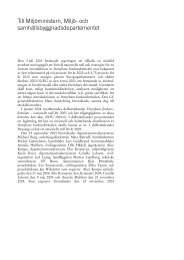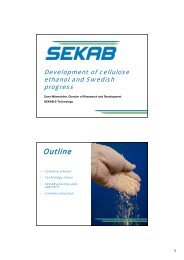Chapter 7 Hoogwijk, M., A. Faaij, B. de Vries and W. Turkenburg, 2008. Global potential of biomass for energy from energy crops under four GHG emission scenarios Part B: the economic potential. Biomass & Bioenergy, in press. Hoogwijk, M., A. Faaij, B. Eickhout, B.de Vries and W. Turkenburg, 2005. Potential of biomass energy out <strong>to</strong> 2100, for four IPCC SRES land-use scenarios. Biomass & Bioenergy 29: 225-257. Hunt, S., J. Easterly, A. Faaij, C. Flavin, L. Freimuth, U. Fritsche, M. Laser, L. Lynd, J. Moreira, S. Pacca, J.L. Sawin, L. Sorkin, P. Stair, A. Szwarc and S. Trindade, 2007. Biofuels for Transport: Global Potential and Implications for Energy and Agriculture. prepared by Worldwatch Institute, for the German Ministry of Food, Agriculture and Consumer Protection (BMELV) in coordination with the German Agency for Technical Cooperation (GTZ) and the German Agency of Renewable Resources (FNR), ISBN: 1844074226, Published by EarthScan/James & James, 336 pp. International Energy Agency, 2006. World Energy Outlook 2006, IEA Paris, France. Kahn Ribeiro, S., S. Kobayashi, M. Beuthe, J. Gasca, D. Greene, D.S. Lee, Y. Muromachi, P.J. New<strong>to</strong>n, S. Plotkin, D. Sperling, R. Wit and P.J. Zhou, 2007: Transport and its infrastructure. In: B. Metz, O.R. Davidson, P.R. Bosch, R. Dave and L.A. Meyer (eds.), Climate Change 2007: Mitigation contribution of Working Group III <strong>to</strong> the Fourth Assessment Report of the Intergovernmental Panel on Climate Change, Cambridge University Press, Cambridge United Kingdom and New York, USA. Larson, E.D., 2005. A Review of LCA Studies on Liquid Biofuel Systems for the Transport Sec<strong>to</strong>r. Energy for Sustainable Development 11: Oc<strong>to</strong>ber 2005. Lynd, L.R., W.H. van Zyl, J.E. McBride and M. Laser, 2005. Consolidated Bioprocessing of Lignocellulosic Biomass: An Update. Current Opinion in Biotechnology 16: 577-583. Macedo, I.d.C., M.R.L.V. Leal and J.E.A.R. Da Silva, 2004. Assessment of greenhouse gas emissions in the production and use of fuel <strong>ethanol</strong> in Brazil. Secretariat of the Environment of the State of São Paulo, Brazil. Accessible at: http://www.unica.com.br/i_pages/�les/pdf_ingles.pdf OECD/FAO, 2007. Agricultural Outlook 2007-2016. Paris, France. Smeets, E., M. Junginger, A. Faaij, A. Walter, P. Dolzan and W. Turkenburg, 2008. �e sustainability of Brazilian Ethanol; an assessment of the possibilties of certi�ed production. Biomass & Bioenergy 32: 781-813. Tijmensen, M.J.A., A.P.C. Faaij, C.N. Hamelinck and M.R.M. van Hardeveld, 2002. Exploration of the possibilities for production of Fischer Tropsch liquids via biomass gasi�cation. Biomass & Bioenergy 23: 129-152. Wall-Bake, J.D., M. Junginger, A, Faaij, T. Poot and A. da Silva Walter, 2008. Explaining the experience curve: Cost reductions of Brazilian <strong>ethanol</strong> from sugarcane. Biomass & Bioenergy, in press. Williams, R.H., E.D. Larson, R.E. Ka<strong>to</strong>fsky and J. Chen, J., 1995. M<strong>ethanol</strong> and hydrogen from biomass for transportation, with comparisons <strong>to</strong> m<strong>ethanol</strong> and hydrogen from natural gas and coal. Centre for Energy and Environmental Studies, Prince<strong>to</strong>n University, reportno. 292. 180 <strong>Sugarcane</strong> <strong>ethanol</strong>
Chapter 8 The global impacts of US and EU biofuels policies Wallace E. Tyner 1. Introduction �e major biofuels producers in the world are the US, EU, and Brazil. Figure 1 shows the global breakdown of biofuels production for 2006. �e US and Brazil combine <strong>to</strong> produce three-fourths of global <strong>ethanol</strong>, and the EU produces three-fourths of global biodiesel. �e US over<strong>to</strong>ok Brazil in <strong>ethanol</strong> production, and global production now exceeds 50 billion liters. Biodiesel <strong>to</strong>tal production is much smaller. In the US, Brazil, and the EU, the biofuels industries were launched with some combination of subsidies and mandates plus border protection. As production levels have grown and as oil prices have risen, all three are now switching in di�erent degrees from reliance on subsidies <strong>to</strong> reliance on mandates. One reason is the government budget cost of subsidies, which increase as production increases. Mandates also have a cost, but it is paid by consumers at the pump assuming the biofuel is more expensive <strong>to</strong> produce than the petroleum based fuel it replaces. �e consumer cost of a mandate is directly related <strong>to</strong> oil price. At low oil prices, a mandate can be expensive for consumers because high cost renewable fuel is mandated in lieu of a certain fraction of relatively lower cost petroleum. At high oil prices, the renewable fuel may even be less expensive than petroleum based fuels, so the cost can be much lower or zero. EU 3% India 4% China 8% others 11% Brazil 37% Ethanol USA 37% USA 20% others 4% Biodiesel EU 76% World <strong>ethanol</strong> production: 49.3 billion liters World biodiesel production: 5.6 billion liters Figure 1. Global biofuels production, 2006. Data sources: Earth Policy Institute (2006), Renewable Fuels Association (2007), European Biodiesel Board (2007). <strong>Sugarcane</strong> <strong>ethanol</strong> 181
- Page 1 and 2:
Sugarcane ethanol Contributions to
- Page 3 and 4:
Table of contents Foreword 11 José
- Page 5:
Chapter 8 �e global impacts of US
- Page 8 and 9:
Foreword �e use of biofuels as a
- Page 11 and 12:
Executive summary Do biofuels help
- Page 13 and 14:
Executive summary 12. Projections o
- Page 15 and 16:
Chapter 1 Introduction to sugarcane
- Page 17 and 18:
Introduction to sugarcane ethanol A
- Page 19 and 20:
Introduction to sugarcane ethanol C
- Page 21 and 22:
Introduction to sugarcane ethanol F
- Page 23:
Introduction to sugarcane ethanol H
- Page 26 and 27:
Chapter 2 Production (million tons)
- Page 28 and 29:
Chapter 2 Table 2. Sugarcane produc
- Page 30 and 31:
Chapter 2 Harvested area (million h
- Page 32 and 33:
Chapter 2 million hectares 8 7 6 5
- Page 34 and 35:
Chapter 2 Table 5. Global significa
- Page 36 and 37:
Chapter 2 (FAOSTAT, 2008). �e lan
- Page 38 and 39:
Chapter 2 indicating that sugarcane
- Page 40 and 41:
Chapter 2 and vinasse produced duri
- Page 42 and 43:
Chapter 2 • • • • Harvested
- Page 44 and 45:
Chapter 2 2.2. AEZ assessment of la
- Page 46 and 47:
Chapter 2 The quantified descriptio
- Page 48 and 49:
Chapter 2 Table 8 summarizes by reg
- Page 50 and 51:
Chapter 2 Table 9. Suitability of u
- Page 52 and 53:
Chapter 2 Table 10. Suitability of
- Page 54 and 55:
Chapter 2 of bio-diversity and land
- Page 56 and 57:
Chapter 2 FAO, 1987. 1948-1985 Worl
- Page 58 and 59:
Chapter 2 Smeets, E., M. Junginger,
- Page 60 and 61:
Chapter 3 Considering that this deb
- Page 62 and 63:
Chapter 3 1,000 ha 9,000 8,000 7,00
- Page 64 and 65:
Chapter 3 Another source of data on
- Page 66 and 67:
Chapter 3 Figure 3. Different land
- Page 68 and 69:
Chapter 3 1-Pastureand crops expans
- Page 70 and 71:
Chapter 3 Given that the model is u
- Page 72 and 73:
Chapter 3 to the case studies; (d)
- Page 74 and 75:
Chapter 3 Mato Grosso do Sul in 200
- Page 76 and 77:
Chapter 3 the Pasture class increas
- Page 78 and 79:
Chapter 3 Table 5. Number of sugarc
- Page 80 and 81:
Chapter 3 of 12.6% from 2001 to 200
- Page 82 and 83:
Chapter 3 Table 6. South-Centre: ex
- Page 84 and 85:
Chapter 3 4.5. Options for approach
- Page 86 and 87:
Chapter 3 states that have lost pas
- Page 88 and 89:
Chapter 3 It is important to contex
- Page 91 and 92:
Chapter 4 Mitigation of GHG emissio
- Page 93 and 94:
Table 1. Basic data: sugarcane prod
- Page 95 and 96:
Mitigation of GHG emissions using s
- Page 97 and 98:
GHG emission (kg CO 2 eq/m 3 etOH)
- Page 99 and 100:
Mitigation of GHG emissions using s
- Page 101 and 102:
Table 7. Soil carbon content for di
- Page 103 and 104:
Mitigation of GHG emissions using s
- Page 105 and 106:
5. Conclusions Mitigation of GHG em
- Page 107:
Mitigation of GHG emissions using s
- Page 110 and 111:
Chapter 5 Oil reserves - Gasoline/d
- Page 112 and 113:
Chapter 5 in research and developme
- Page 114 and 115:
Chapter 5 Table 3. Summary of main
- Page 116 and 117:
Chapter 5 3. Environmental indicato
- Page 118 and 119:
Chapter 5 Table 4. Carbon stock in
- Page 120 and 121:
Chapter 5 3.2. Water Total carbon i
- Page 122 and 123:
Chapter 5 3.3. Soil and fertilizers
- Page 124 and 125:
Chapter 5 3.4. Management of diseas
- Page 126 and 127: Chapter 5 Table 10. Sugarcane and v
- Page 128 and 129: Chapter 5 in the implementation of
- Page 130 and 131: Chapter 5 Table 11. Continued. Crit
- Page 132 and 133: Chapter 5 Brazilian Government. Lei
- Page 134 and 135: Chapter 5 São Paulo State Governme
- Page 136 and 137: Chapter 6 2. Development of the eth
- Page 138 and 139: Chapter 6 blends by car manufacture
- Page 140 and 141: Chapter 6 Brazil have been roughly
- Page 142 and 143: Chapter 6 Overall there are few di
- Page 144 and 145: Chapter 6 3.2.1. The impact of exis
- Page 146 and 147: Chapter 6 �e use of ethanol in he
- Page 148 and 149: Chapter 6 cropping systems that pro
- Page 150 and 151: Chapter 6 certainty, the supply of
- Page 152 and 153: Chapter 6 De Vries, B.J.M., D.P. va
- Page 155 and 156: Chapter 7 Biofuel conversion techno
- Page 157 and 158: Biofuel conversion technologies �
- Page 159 and 160: Biofuel conversion technologies In
- Page 161 and 162: Biofuel conversion technologies the
- Page 163 and 164: Biofuel conversion technologies Imp
- Page 165 and 166: Biofuel conversion technologies Pro
- Page 167 and 168: Investment costs (Euro/kWth input c
- Page 169 and 170: 4.2. Greenhouse gas balances Biofue
- Page 171 and 172: Reduction in CO equivalent emission
- Page 173 and 174: Biofuel conversion technologies �
- Page 175: Biofuel conversion technologies pot
- Page 179 and 180: The global impacts of US and EU bio
- Page 181 and 182: The global impacts of US and EU bio
- Page 183 and 184: The global impacts of US and EU bio
- Page 185 and 186: The global impacts of US and EU bio
- Page 187 and 188: Table 1. Change in output due to EU
- Page 189 and 190: The global impacts of US and EU bio
- Page 191 and 192: Forest cover Pasture cover USEU 201
- Page 193: The global impacts of US and EU bio
- Page 196 and 197: Chapter 9 also risks and serious tr
- Page 198 and 199: Chapter 9 Box 2. Bioethanol stoves
- Page 200 and 201: Chapter 9 �e highest impact on po
- Page 202 and 203: Chapter 9 the increased generation
- Page 204 and 205: Chapter 9 o�ers to support the MD
- Page 206 and 207: Chapter 9 Price variation (%) 14 12
- Page 208 and 209: Chapter 9 Dufey et al., 2007a). Leg
- Page 210 and 211: Chapter 9 manufactured directly fro
- Page 212 and 213: Chapter 9 in mechanical aid for the
- Page 214 and 215: Chapter 9 Table 1. Import tariffs o
- Page 216 and 217: Chapter 9 3.8. Improving efficiency
- Page 218 and 219: Chapter 9 some minimum transport in
- Page 220 and 221: Chapter 9 IEA, 2004. Biofuels for T
- Page 223 and 224: Chapter 10 Why are current food pri
- Page 225 and 226: Why are current food prices so high
- Page 227 and 228:
2.4 Long-term drivers of supply Why
- Page 229 and 230:
3.1. Effects on the supply side Why
- Page 231 and 232:
3.3 Policy responses to rising food
- Page 233 and 234:
3.4. Other effects • Why are curr
- Page 235 and 236:
- - - - Why are current food prices
- Page 237 and 238:
18 16 14 12 10 8 6 4 2 0 5. The fut
- Page 239 and 240:
• • • Why are current food pr
- Page 241 and 242:
6.1. Policy implications Why are cu
- Page 243:
Why are current food prices so high
- Page 247 and 248:
Authors Dr. Marcos Adami, senior re
- Page 249 and 250:
Keyword index A Africa 204, 205, 20
- Page 251:
M maize 20, 83, 104, 173, 184, 187,












